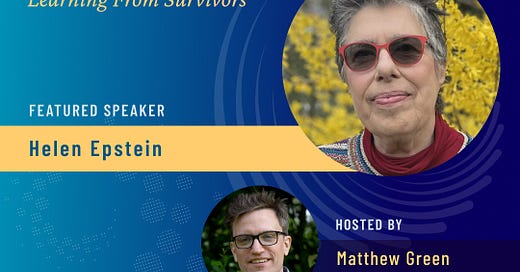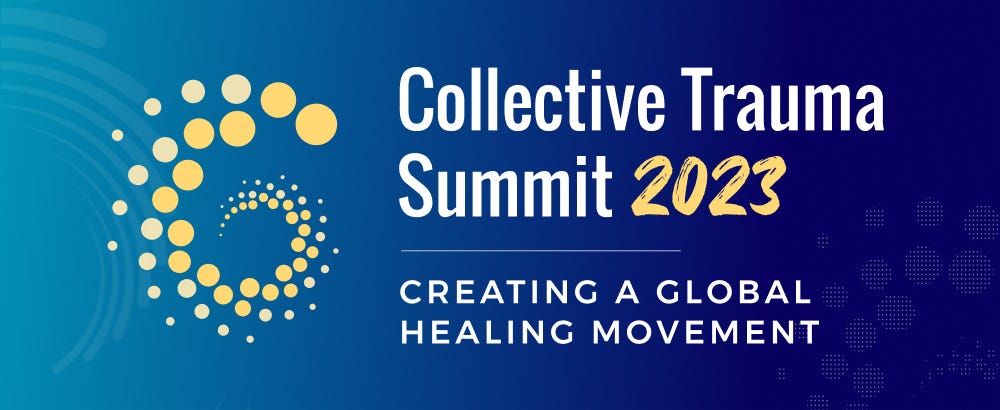Notes ahead of the Summit: Helen Epstein
How Children of the Holocaust unlocked collective healing on an epic scale.
This is the first in a series of posts reflecting on interviews I’ve conducted for the Collective Trauma Summit 2023, which runs from September 26-October 4. You can register to watch the interviews for free during the 48 hours after they go online. Packages are available for lifetime access to talks by more than 60 speakers, along with poetry, music, guided practices and more. Please do join us for this incredibly inspiring, diverse and nourishing event.
Resonant World #42
I wouldn’t normally expect much new to come from interviewing a journalist about a book they’d written more than 40 years ago.
But Children of the Holocaust is such a seminal text in the field of integrating collective and inter-generational trauma, that the conversation I had with author Helen Epstein for the Collective Trauma Summit 2023 felt as vibrant as if her book had just been published. (Our interview goes live on September 30).
Epstein was born in Prague towards the end of 1947. Her father, a former Olympic water polo player, and her mother, a dress designer, who had both survived the Nazi concentration camps, fled shortly after the Communist takeover of what was then Czechoslovakia the following year.
Children of the Holocaust starts as a memoir of Epstein’s childhood as her parents struggle to build a life in the Upper West Side of Manhattan, then broadens into an account of her quest to connect with other children of survivors — the second generation — and their dawning understanding of the legacy they carry.
The book grew out of a cover story Epstein had written for the New York Times magazine, which prompted a deluge of letters from second generation members around the world. But the article turned out to be so much more than a work of reportage — it was a catalyst for individual and collective healing, on an epic scale.
As Epstein told me:
“The impact was huge. First of all, because it was the New York Times, and because then before the internet, the New York Times was really the kind of lingua franca of the world. It was reprinted everywhere in the world. And what it did immediately for me was people all over the world wrote me letters. Long, long letters. Some of them were 10-, 11-, 12-page letters, and these people were from many different communities. I received letters from children of Nazis; I received letters from the Armenian community; I received letters from children of alcoholics, from children of Vietnam War veterans. So I had not thought how universal what I had written about was. I thought I was coming from a very small place, in the sense of I was from Czechoslovakia, which was a very small country, and I was Jewish, which is a small religion, and I didn’t think that this would apply to so many people. And quite amazingly, I started being invited to speak about this, and the first people who invited me were the Armenian Archdiocese of New York, which is a huge institution. And all of a sudden I realized how universal trauma was, and particularly displacement and genocide.”
“Impossible to Imagine”
By naming and exploring the legacy inherited by the second generation, the book opened a door for countless descendants of Holocaust survivors to start to recognise that their individual struggles were part of something much bigger. That, in turn, helped more people to come together to harness the power of community to integrate their experiences, and access an expanded sense of connection, purpose and meaning. In a telling passage in the preface to the 2010 edition, Epstein writes:
“It’s impossible in 2010, to imagine how hard it was for me to write Children of the Holocaust, how difficult to believe — even with the evidence of all those long detailed letters — that my private experience could be considered significant in the public sphere.”
It’s a measure of the progress that has since been made that in place of the single page of references in the first edition, the book now contains a greatly expanded bibliography on the second generation, and inter-generational trauma more broadly.
Foundation
Not only is the Holocaust such a forbidding topic in its own right, it is also so central to the origins of the collective trauma work that I’m engaged with via Thomas Hübl’s Timeless Wisdom Training, that I’ll confess I felt some trepidation about interviewing Epstein, worried I might miss the mark in some way. (A big thank you to fellow students Danny Cohen and Diane Kaplan for conversations that helped me prepare).
Hübl’s development of his Collective Trauma Integration Process for facilitating large groups to integrate collective trauma emerged from his work decades ago with Holocaust survivors and their children. It’s a measure of the enduring influence of this foundation that Hübl’s 2020 book on collective trauma references Children of the Holocaust on the first page of the prologue.
Nevertheless, this enormous trauma field is new territory for me. The closest personal connection my family has is an indirect one: My great-uncle Lionel Brown was shot by an SS firing squad alongside two other British soldiers in northern Italy after they were betrayed and captured, having escaped a prisoner of war camp in 1943.
Contacting the unacknowledged grief I’d inherited over Lionel’s death during the Timeless Wisdom Training early last year was one of my most visceral experiences of how ancestral trauma can live on in us, subtly colouring our perceptions.
By the same token, the trans-generational and collective aspects of the Holocaust have at times broken through powerfully during the training, particularly during some of the sharings by German and Israeli participants. Earlier this year, I was privileged to publish this powerful account by Danny of his experience of integrating a fragment of the Holocaust during a previous group facilitated by Hübl.
“Finishing School”
While this historical episode is still beyond my comprehension, I found my interview with Epstein incredibly moving. She was such a warm, eloquent and approachable interviewee — and full of humour, despite the subject matter.
What stood out for me was not only the incredible story of her parents’s suffering — but how careful Epstein was to acknowledge the resources of courage, ingenuity and resilience they had also bequeathed (Resonant World #27).
She told me with some mirth how her mother Franci had managed to convince the Nazi doctor Josef Mengele that she was an electrician — guaranteeing her passage from Auschwitz to a labour camp in Hamburg, where she would survive the war.
We went on to explore what her mother had meant by her extraordinary statement to Epstein that Auschwitz had been like a “humanitarian finishing school.”
Here’s Franci, as quoted in Children of the Holocaust:
“I think it made me more socially conscious. I was quite a frivolous, superficial young girl when the war broke out. But after three years in camp, I learned an enormous amount about human nature, about loyalty, about treachery. It was a very condensed education in coping, in living, and in sorting out a sense of values. You had to decide what was important in life: was it money or possessions, or people, or love, or friendship? I think that is, in a nutshell, what it was: a humanitarian finishing school.”1
I’d been stunned by this passage — struggling to imagine how a survivor could reframe her experience in such a way.
You can see Epstein’s response to my incredulity in the clip below:
There’s of course no substitute for watching the whole interview (available free on September 30-31 for anyone who registers for the summit).
I felt very privileged to have spent an hour with an amazing woman who’d mastered the art of turning writing into medicine. Our encounter prompted renewed questions on my own role as a journalist, and what would be the most medicinal form of writing I could administer at this time.
Helen Epstein Biography
American author and journalist Helen Epstein is a daughter of Holocaust survivors and is best known for her non-fiction trilogy Children of the Holocaust; Where She Came From; and The Long Half-Lives of Love and Trauma. Born in Prague and raised in New York City, she lectures in the Americas and Europe. Most recently, she edited her mother’s memoir Franci’s War and wrote Getting Through It, a medical memoir of surviving surgery, chemotherapy, and radiation to treat GYN cancer. She is now working on a book about her life writing non-fiction.
Further Reading
I recently came across this Aeon essay on Germany’s reckoning with the legacy of the Holocaust, which I found very informative.
I write Resonant World in my spare time from my role as an editor at nonprofit climate news service DeSmog. One way to support this project is to like or comment on the posts, or share them with your own networks.
If you want take out a paid subscription, that is also is a huge boost.
And finally, I gratefully accept any variety of coffee — which helps fill the cup I am literally sipping from now as I sit in a local co-working space writing this. Thank you!
Work with Me: Soul Witnessing via the Tarot
If you enjoy Resonant World, then you may find a Tarot reading with me a helpful resource for tapping into the kind of inner guidance that can help us to navigate life’s challenges with greater confidence, ease and flow.
I work with the cards to connect you to the part of yourself that knows the answers you seek, and can communicate precisely via the 1,200 symbols in the Thoth deck. It is amazing to see what the beautiful, multi-layered imagery can unearth from just below the surface of our awareness — and feel the clarity that a reading can unlock.
I charge £70 / $90 for a session that typically lasts 90 minutes, including a guided meditation to establish a coherent field linking us with the cards. Sessions via Zoom, with recording and photo of the spread. (I am a member of the Tarot Association of the British Isles and abide by its code of ethics).
Page 188. Epstein, H. Children of the Holocaust: Conversations with Sons and Daughters of Survivors. Plunkett Lake Press. Kindle Edition.









In my fantasy world, i give you my woven and tattered bits of commentary and insight, and they come out in glycerine eloquence like this. Your capacity for speaking to the most challenging themes in today's world with clarity and compassion is a real genius. Coffee on me, for sure. It is also refreshing to have men speak well to the essential need for healing on so many levels.